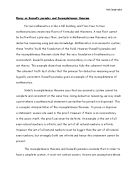As Euclid demonstrated, in a line there are many points; in a sense referring to a collection of objects that does not contain a finite number of objects. A German mathematician named George Cantor showed that there are different
Gibson, Lourdes page 2
orders of infinity, the infinity of points on a line being of a greater order than of prime numbers (positive integer that has exactly two positive factors, one and itself). In geometry one might define a point of infinity as the point of and intersection of two parallel lines. Cantor defined two kinds of infinite numbers, the ordinal numbers; is identified in a stopping point when counting; and the cardinal numbers, define how many numbers a set may contain; when that set is too large it is called uncountable. Cantors views have caused modern mathematics to accept actual infinity.
The symbol for infinity is a little ribbon ∞. Infinity is represented with a little ribbon because as one can imagine walking around the two loops forever never knowing where and when to stop. The symbol indicates an unbounded limit. X → ∞ meaning that X grows beyond any assigned value, X → -∞ meaning X is less than any assigned value. Infinity is not a real number but an extended real number line, an extended number line is obtained by adding two elements [ +∞ and -∞ ] plus infinity and minus infinity. These elements[+∞and -∞] involves the arithmetic operations, in where, infinity plus infinity equals infinity, infinity times infinity equals infinity, negative infinity times negative infinity equals infinity, negative infinity plus negative infinity equals negative infinity, infinity times negative infinity equals negative infinity. this is as clear as it gets, like what Isha Upanishad said, “ if you add a part of infinity or if you remove a part of infinity, still what remains is infinity.”
Galileo was the first to discover that we can place an infinite set into one of its proper sublets, any part of the set. For example we can match up the set of
Gibson, Lourdes page 3
natural numbers with a set of square numbers. It appeared as though a set was naturally smaller than the set of which it is a part; they are however in some sense the same size. Galileo once said trying to find the infinite will arouse difficulties for we have finite minds. The totality of numbers is infinite as well as its squares.
In philosophy infinity can be recognized through space and time. Space is endless, it is continuous, and beyond earth no one knows what they would find. There would probably and infinity number of galaxies, stars, and planets. The whole universe may as well be infinity. Time too is infinity because no one knows when time would stop or when time had started. You can’t race with time. Time
goes on and on, time would not even pause for anyone, time is eternity. Even thought life ends time shall continue. Just like you can talk about infinity all you want but you would never get close to an end. Thoughts are endless too, unless of course you die and your brain seizes to function then that is the end of your thoughts, or is it? I can’t exactly compare infinity with thoughts because thoughts end and infinity doesn’t, how ever it is possible to compare, because you can write down your thoughts and theories and smarter people would discover your theory and makes it much more explainable and more and more people would know about it and think about it. This would make your idea continuous even though you’re not the one thinking it. Example just like this essay about infinity, infinity may have been discovered million of years ago but theories about it continues on and tons of people are trying to find its end, in ways of using math, science, philosophy,…etc.
Gibson, Lourdes page 4
In conclusion trying to find out what infinity really is will drive you mad. Theories in math that says infinity can be represent using the sequence and series formulas. But how sure are they that those formulas are even close to the infinite number. An infinite number do exist but no matter how long man may exist on earth I think no man would ever reach the infinite number. I’ve come to a conclusion that infinity ay as well be applied as much as math is used in every second of our lives. No matter how long you would study every characteristic, every formula made about infinity, and every theory studied about infinity all you will get come up with would be infinity. The quote that will always remain true no matter how many theories bout infinity will be discovered is that, “if you add a part of infinity or if you remove a part of infinity, still what remains is infinity.”







